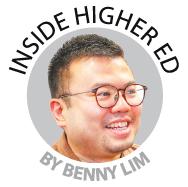EMBARKING on a PhD programme is no doubt a major life decision. One has to commit years to undertake a substantial research, before writing up a doctoral thesis, usually in the range of 60,000 to 80,000 words.
Before putting a foot into a PhD programme, it is necessary to first justify why the degree is necessary.
Some careers may require candidates to be equipped with PhD qualifications.
In the field of academia, doctoral degrees are still very much preferred for entry and upward mobility.
Beyond academia, a doctoral degree could be a fulfillment of one’s epistemic curiosity, in the larger context of self-actualisation.
Of course, there are individuals who want the “Dr” title to enhance their social and cultural capital.
Once the need is established, the next step is to undergo an honest self-assessment of one’s current circumstances, which include limitations and constraints.
Thereafter, the final step is to identify the “right” PhD programme that best matches one’s need and current circumstances.
For some, pursuing a PhD degree full time in a highly ranked university on a full scholarship with a fixed monthly stipend may be the ideal situation.
Despite so, this might not be the best scenario for others, such as working adults and/or those with family commitments.
Here are four key factors to consider when deciding on the “right” PhD programme.
University’s reputation
There are different approaches to understanding a university’s reputation, one of which is its ranking.
For individuals seeking a career in academia, having a PhD degree from a highly ranked university will definitely boost one’s competitive advantage.
Yet, many top-ranked institutions tend to consider PhD applicants with degrees from similarly well-established institutions.
Furthermore, one should also be mindful that university’s ranking is just one of the several approaches in gaining an edge.
To me, the legitimacy and accreditation of a university is already a sign of its reputation. For instance, institutions (and programmes offered) in Malaysia are subjected to the strict purview of the Malaysian Qualifications Agency.
Despite its ranking, each accredited and approved institution of higher learning in Malaysia is reputable in its own right.
For postgraduate programmes offered offshore, legitimacy is based on whether the institution and/or qualification is accredited or endorsed by the education ministry in its home country.
Contrary to what some may think, there is no authority in Malaysia that maintains a list of recognised institutions and postgraduate degrees from around the world.
Matching of discipline
The chosen PhD programme must fit one’s preferred discipline. Aspiring academicians should think hard about their area of expertise 10 years down the road.
The chosen programme should then prepare individuals to developed core competencies in the relevant areas.
As more universities embrace the interdisciplinarity concept, one should consider programmes that encourage interdisciplinary research, rather than a rigid, fixed discipline.
Mode and fees of study
The journey to earning a PhD degree could be an extremely costly affair.
Apart from paying for the education, there are opportunity costs incurred, especially for those who choose to pursue the degree full time.
One should always look into opportunities for scholarships or studentships, bearing in the mind that awardees are often required to undertake additional duties assigned by their department or supervisor, such as undergraduate tutoring.
Most certainly, it is possible to maintain employment while pursuing a PhD degree. Most universities refer this mode of study as either part-time or distance learning (especially if the awarding institution is offshore). Scholarships are usually not offered to part-time/distance learning students. Instead, these students may be given access to instalment schemes.
Many universities expect students on part-time/distance learning mode to take a longer time (sometimes double the time) to complete and graduate as compared to full-time students.
Nevertheless, there are also universities that do not clearly differentiate the duration for the different modes, especially if the doctoral research is related to one’s professional background.
Other academic requirements
Some PhD programmes allow students to delve straight into their research project on enrolment, while others have coursework and candidacy requirements.
The latter mode requires students to successfully complete several courses and/or qualifying examinations before they could embark on their doctoral research.
Some programmes, particularly in Malaysia’s public universities, expect their candidates to publish papers in academic journal prior to completion.
Having said so, no one set of requirements is superior to others. Again, it’s about understanding one’s objectives and constraints. A candidate with a highly current research idea might want to embark on the project on enrolment as soon as possible.
The four factors listed above are not exhaustive. Yet in my conversations with many potential PhD students, these are crucial considerations.
I have seen students who worked hard to finally get admitted into a PhD programme in their dream university.
Unfortunately, they ended up struggling and eventually, got demotivated due to a wrong fit of discipline, or stress, accumulated from fulfilling scholarship duties and candidacy requirements.
There are also individuals who have delayed their PhD applications year after year because they could not afford to leave their employment, but at the same time, they are also unwilling to consider distance learning as a possible option.
I strongly believe that there is a right PhD programme out there for everyone.
For my personal PhD journey, I reviewed over 300 programmes before shortlisting and applying to a few that best fit my circumstances.
Dr Benny Lim is a professor and director of the Masters programme in Communication and Media Studies, Università Telematica Pegaso (Italy). The views expressed in this article are his own and do not represent the university he is associated with. Comments: letters@thesundaily.com













